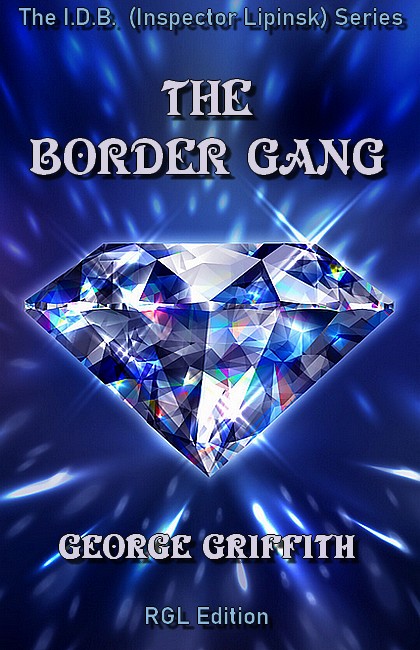
RGL e-Book Cover©
Roy Glashan's Library
Non sibi sed omnibus
Go to Home Page
This work is out of copyright in countries with a copyright
period of 70 years or less, after the year of the author's death.
If it is under copyright in your country of residence,
do not download or redistribute this file.
Original content added by RGL (e.g., introductions, notes,
RGL covers) is proprietary and protected by copyright.

RGL e-Book Cover©

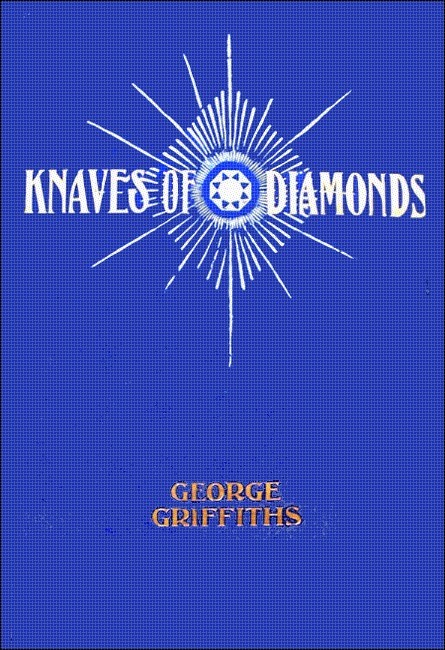
"Knaves of Diamonds," C. Arthur Simpson,
London, 1899
(with author's surname misspelt)
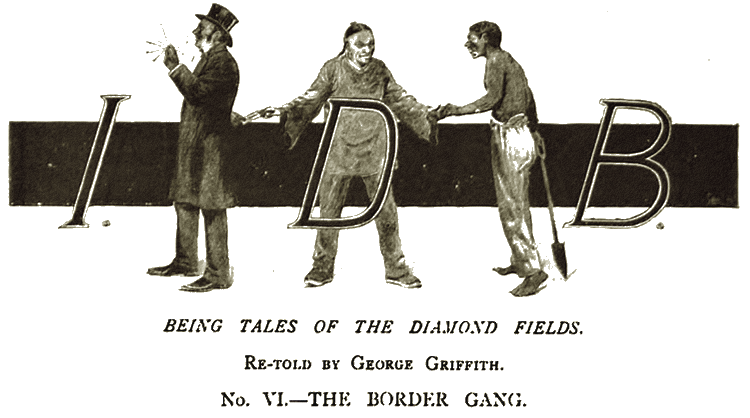
Headpiece from Pearson's Magazine
"EH, mon, you're no tellin' me! It's the domdest, barefacedest robbery! It's dog eatin' dog—just cannibalism in beesness, that's what it is."
"It vas true, though, Sandy, s'welp me, may I never see the glint of a gonivah again if it isn't. There vas three thousand pounds' worth of the klips in poor little Tommy's insides, as you know. The tecs pulls me up near the border. In the dark Tommy slips out of the cart as usual, and makes for the clump of gums on the other side of the drift without bein' seen. The tecs find nothing, of course, and I drives on, thinking what sort of a lawsuit we shall have this time against Lipinski and his people, crosses the drift, and pulls up by the trees. I whistles, and Tommy, like a good obedient little tyke what knows his bizness, jumps in and—"
"Oh, Lord, to think ye'd got such a beautiful lot so far only to—aweel, go on, Ike, and let's have the rest of it."
"As I says, the dog jumps in, and I drives off again. 'Bout a hundred yards farther on both my horses comes to the ground with a crash, and I goes after them on to my head. When I comes to myself and picks myself up, there was half-a-dozen fellows on horseback round the cart. One jumps down, and before I can so much as shout, he has a cloth over my head and ties me up so tight I can neither see nor speak. Then he knocks with his knuckles on my head, and tells me if I don't want a bullet in it I'll keep quiet and be good. Of course I vas as good as they make 'em."
"But the dog, mon, why didn't he mak' a bolt for't when he saw there was trouble? He's been vera weel trained. I'd 'a thocht he might 'a got awa' in the scrimmage."
"He didn't have a chance. I hears him give a smothered-up yelp and squeal, and from that I knows that he is like my head—in a bag. That tells me that they had tumbled to the lay, or that there was someone there that knew it. Well, they bundles me and the dog into the cart, and drives away somewhere for about half-an-hour. Then they pulls up, hauls me out, hustles me into a house of some sort, and takes the bag off my head. When I looks about me I was in a bit of a small room, and there were four fellows there, all with masks on."
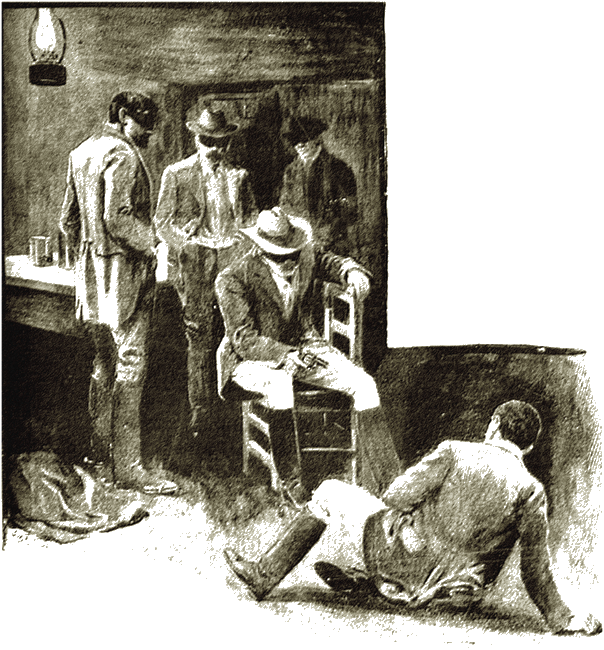
"There were four fellows there, all with masks on."
"Kidnappers an' midnight robbers—maybe murderers as weel!" groaned the Scotchman. "Ike, mon, I'm thinkin' ye had a narrow escape. That Free State's a dom'd sight too free if it's comin' to this. It's naethin' better nor a savage land wi'out law nor order in't. What did they do till ye then?"
"They asked me how many klips I'd got, and where they were, and of course I says I have none, and they can search me if they like, and they does—a good bit worse than the tecs do, I can tell you. Of course they finds nothin', and then they laughs and says if I haven't got them the dog has. So they turns poor Tommy out of the sack and—s'welp me, old pal, I doesn't like to tell you what happened then. I'd educated that dog perfect, and I loved the little fellow, and, besides, he was worth a lot of money with all he knew!"
Sandy Fraser's little Hebrew accomplice quite broke down here for a moment or two, and Sandy himself gave a sympathetic sniff, for they had both lost, not only a lot of money, but also a guiltless accomplice whom it would be very hard to replace.
"They murdered him, Sandy, right before my eyes in a big tin foot-bath, and, of course, they found the klips. Then they offered to sell them back to me for two thousand, and told me they'd have made it five hundred more if they hadn't had to kill the dog."
"Eh, sakes, what a murderous price! Blank robbery! Why, they cost us three hundred straight from the kaffirs. An' ye paid?"
"Well, they was worth three thousand trade price, and the thieves knew it; so I did. I gave them a draft on the bank here, and they kept me there till one of them got the cash and brought it back, and then they ties my head up again, puts me into the cart, and drives me away with the klips in my pocket. When they took the bag off it was night, and I was in a little kloof. They showed me the way to Freetown, and rode off. I got into Freetown by the morning, and found Sandheim there wondering if I was dead or gone to the Breakwater for change of air.
"Well, I told him the story, and got three thousand three hundred out of him for the klips on the strength of it. Then I drives back, breaking my heart about poor little Tommy, and wondering where we shall get another dog like that. That Chinaman's dog that he fooled Löwenfeldt so sweetly with wasn't in it with poor Tommy."
"Nay, that he wasn't, mon. Why, Tommy must 'a run close on twenty thousand worth for us, and might 'a run twenty thousand worth more wi'out a suspeecion, wi' that wonderfu' stomach o' his. But there, he's dead and gone, the puir wee martyr, and we'll just go and tak' a drink till his future in the happy huntin' grounds. But tell me, Ike, lad, did ye ha'e nae notion wha ony o' they thievin' murderers might 'a been? Some o' them must 'a known ye, or they'd never 'a suspected the dog."
"They was always masked when I saw any of them; but, Sandy, if I wasn't sure as death that Lipinski and his chaps did for Seth Salter that night he ran the big parcel and they got it back, I could swear that the boss of 'em had just his Yankee twang, and his build wasn't unlike, neither," replied Ike, whose English was of the Oriental order, and whose tenses changed with the variations of his mental temperature. "Now, where was we going to? Let's go the Queen's—that's Lipinski's place. Let's see if he's there, and if he's heard anything about this gang over the line."
When they entered the bar-room they found Mr. Inspector Lipinski, very much at home, and apparently the central figure of the somewhat motley crowd that was wont to foregather there for their evening lime-juice, to use a conveniently generic term.
He was standing, as usual the most nattily dressed man in the place, with one elbow resting on the bar counter, and a glass half full of whisky and soda beside him. Opposite to him stood no less a personage than Mr. Michael Mosenstein—the events herein to be described happened some two months after Jossey Mo's vicarious conviction—and there seemed to be a discussion of some little heat going on between them. Just as they went in he slapped his glass down on the mahogany, and said in a loud, angry tone:
"Of course you fellows never take any responsibility, unless it's a case of searching private houses and annoying innocent people. But what I say is that this is just as much your affair as the Free State police's. Why don't you combine, instead of everlastingly bickering and letting criminals slip through your fingers? If there's been a robbery on their side of the line to-night, there'll be one on your side to-morrow, or the night after. As for saying that the parcel was illicit, that's all rot, and neither here nor there. Max Sandheim is a perfectly respectable man. Why, I've done business with him myself scores of times."
"I've no doubt you have, Mr. Mosenstein. I wish I'd been there at the time," replied the inspector, with a snap of malice in his tone, which sent a chuckling laugh round the crowd, and brought out a red spot between Mickey's eyebrows. Before he had his retort ready, Ike pushed his way through the half-circle about them, and said, with ill-advised anxiety:
"Wha-at was that? What has happened to Max Sandheim, and when did it happen? Was he robbed?"
"Aw, the blighted eediot!" murmured his partner; but he didn't shout it like a stage aside, and so it wasn't heard. He went to the far end of the counter and ordered a drink, hoping that no one had seen him come in with Ike.
The inspector pulled himself up straight, and, as he could do on occasions, suddenly assumed an air of authority which kept even the angry Mickey quiet while he answered:
"Ah, Mr. Cohen, good-evening! So you've got back all safe, but you're a bit anxious about your friend Sandheim. Very natural, of course. Well, I'm sure you'll be sorry to hear that a few hours after you left him, say about ten o'clock last night, he was held up on the road between Freetown and Boshoff by four armed and masked men, and robbed of a parcel of stones which he valued at four thousand pounds. I daresay you'll know about how near that is to the truth. He rode into Boshoff and reported, and we have just had the news here by telegraph. By the way, how's that dog of yours?"
The crowd noticed unanimously that this was the first time since the story of the Diamond Dog had become common property in camp that the inspector had mentioned one of its species publicly, and they closed up a little, thinking there was something coming. Mr. Mosenstein, for reasons of his own, paid an ostentatiously exclusive attention to his drink, while Sandy Fraser cursed all Jews and dogs in silence and kept his ears anxiously open.
Now Ikey Cohen, though not a strong man, nor yet one of conspicuous pluck, was one of those peculiarly constituted individuals who gain a sort of secondary courage through stress of circumstances, somewhat as runners get their second wind. From what the inspector had said, he saw that he knew a good deal more about his late adventure "on the other side" than he thought he did. Suspicions are sometimes as good as knowledge. He stuck his hands deep down into his pockets, looked Lipinski squarely in the face, and said:
"If you want me to sell you a pup, Mr. Lipinski, I'll be happy to oblige you. I can't sell you that one, because it's dead. But I think I could tell you the name of the man who ordered it to be killed. Anyhow—I—guess—you'd—'a— recognised—his voice—as I calcerlate—I—did."
Ikey didn't do the Yankee drawl at all badly, and the shot went right home. For the first and the last time in his life, Inspector Lipinski lost his self-command in public. But his start was only momentary, and the flush that came into his cheeks died out again in an instant.
"What do you mean by that, sir?" he asked, in a tone as calm as usual, but with a distinctly threatening ring in it.
"Just about what he says, I reckon," drawled Mickey Mosenstein, who was about as good a mimic as he was a juggler. "If you don't recognise that twang, I do. That was well done, Ikey boy. What'll you take? The next's with me."
What might have happened after this no one will ever know, for just at that moment one of the inspector's men entered hurriedly and handed him a note. He opened it, glanced at it, folded it up in his hand, and said:
"Gentlemen, I'm sorry, but, so far as I'm concerned, this entertainment will have to be postponed. Another man wants to see me very urgently about a dog."
With this he drank off the remains of his whisky and soda, and turned and walked to the door, followed by his official satellite, not a little pleased at such an opportunely good "get out" from a situation which was bidding fair to become embarrassing.
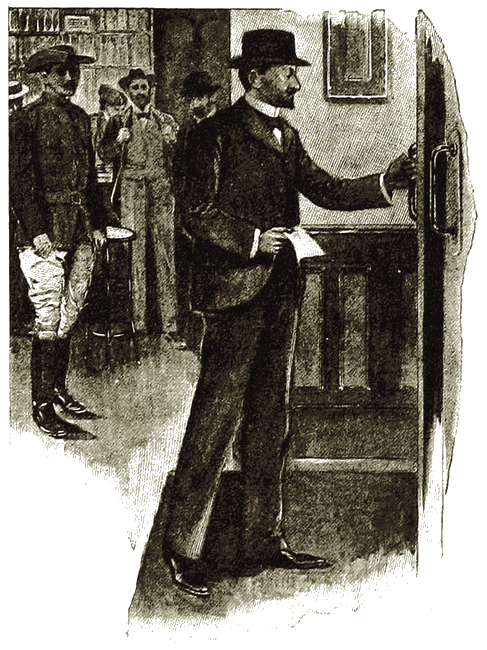
He turned and walked to the door.
He turned and walked to the door.
It pleased the Fates to draw out the tragedy which thus began with the inhuman butchery of poor little Tommy—one of many a like innocent martyr to the unholy cause of I.D.B.—into more scenes than could be reproduced here. The present narrative is, however, only concerned with the last of them, or perhaps it would be more correct to say the last but one, and that which brought the curtain down. As week after week went by, the outrages committed by the mysterious Border Gang, as the unknown desperadoes, who had so suddenly invaded the hitherto comparatively peaceful frontiers of the Free State and Griqualand West, very soon came to be called, seemed to increase in number and daring.
It was quite a curious situation—such a one as the student of human crime had never had the chance of studying before, and may never have again. It was a sort of three-cornered contest between underhand roguery, open violence, and the forces which worked for law and order. The old struggle between the police and the I.D.B. fraternity went on as before, but with an added terror for the evildoer, who, if he eluded the clutches of the law, might the next hour fall into the no more merciful grasp of the gang. The honest and lawful trader still hated the I.D.B. as his worst enemy, but the gang robbed both with an impartiality worthy of a more honourable calling.
The police naturally had anything but a happy time of it. If they devoted an adequate amount of time and force to hunting for the gang—which was never where it was expected or wanted—the occupation of the I.D.B.'s became comparatively pleasant and easy; while, if they did their proper work thoroughly, the gang promptly went on the war-path with renewed vigour and extended scope, and raked in the plunder with both hands from the honest and the dishonest alike.
It will be readily understood that no state of affairs could possibly be more distasteful to Mr. Inspector Lipinski than this. Not only was his professional credit at stake, but men like Mickey Mosenstein, Ikey Cohen, Sandy Fraser, and Alexander Macadam, whom he absolutely knew either to be or to have been involved in extensive I.D.B. transactions, but who were now getting rich, and therefore men of influence in a town where the faculty of making money anyhow was the only one that "got a man on," were making sarcastic comparisons between Hounslow Heath a hundred years ago and the Diamond Fields of to-day, and were asking ugly questions about the efficiency—nay, even the incorruptibility—of the police force in general, and the Detective Department in particular.
It was this last suspicion that touched the puzzled and harassed inspector most keenly. As a practical man he had no belief in miraculous escapes or the possibility of people being in two different places at once, and gradually the conviction forced itself upon him that the immunity of the gang from capture, and its evasion of trap after trap that he had laid for it with all the skill and cunning at his command, could only be due to the connivance of some of his own men and the Free State police, which he knew to be anything but immaculate.
This conviction led him at last to the resolve to risk, not only reputation and position, but life itself on the attempt to personally break up the gang, or at least to penetrate the mystery which shrouded its doings and shielded it from justice. This resolve once made, it did not take a man of his character very long to translate it into action. He caused certain information to leak out through some of the underground channels which were always at his service, to the effect that, in consequence of strong suspicions that the Diamond Mail to Vryburg was going to be held up by the Border Gang on a certain night, when it would be carrying an exceptionally valuable consignment of gems, the stones would be run the night before, as though they were an illicit parcel, over the border to Freetown, and thence conveyed in the usual way to Port Elizabeth instead of Cape Town. The Diamond Mail of the following day was to take no consignment at all, but was to be accompanied by a double guard.
On the appointed night the inspector had a score of his best and most trusted men, armed to the teeth, posted along the border within hail of the point where the road to Freetown crosses it. On the other side a detachment of the Free State police were, by arrangement with the district chief, to be lying in wait ready to act in concert with them, and to catch the gang between the two forces at the moment of attack.
When Inspector Lipinski set out that night to take his part in the working out of his scheme, he took an even more than usually affectionate leave of his daughter—a pretty, graceful girl of between sixteen and seventeen, who was the incarnation of the one romance in his life, the daughter of the only woman he had ever looked upon to love and long for, and the one rose that he had saved out of the paradise which he had once dwelt in.
He went to his office, and changed his usual attire for a suit of clothes that he had never been seen in, a sort of semi-sporting rig that he had had up specially from Cape Town, put his favourite Smith-Wesson in his right-hand coat pocket, and then started out to walk to Beaconsfield. On the way he overtook his kaffir groom, leading his best horse. He mounted, saw that the pair of heavy colts in the holsters were ready for immediate use, and then cantered off towards the border, which he had timed himself to reach a little before one in the morning.
It had been arranged that two of his own men should hail him just before he got to it, and that then the game was to begin. News had reached him that the gang had got wind of the big parcel he was supposed to be carrying, and had vowed to have him and it at any price. If his men only did their duty, and the Free State police kept faith with him, the new terror of the border would be a thing of the past by morning.
Two mounted figures loomed out of the darkness ahead of him, and pulled up on either side of the road. A gruff hail came growling down the wind.
"Is that you, Davies, Mays? All right! I suppose the others are ready. Open a bit and let me through, then chase for all you're worth. You needn't be afraid of catching me."
As he said this, he touched his horse with the spur, and the easy canter broke into a gallop. The two men pulled their animals aside. As he came up, the moon broke through a rift in the clouds, and he saw that they were both masked. It was too late to stop. He ducked his head and dived for his Smith-Wesson, but the next instant a rein, or plaited rope of raw hide, stretched taut across the road, passed over his horse's head and took him under the chin. Then came a jerk that nearly broke his neck, a thump against the hard mud of the road, a mist of dancing stars before his eyes, and then darkness.
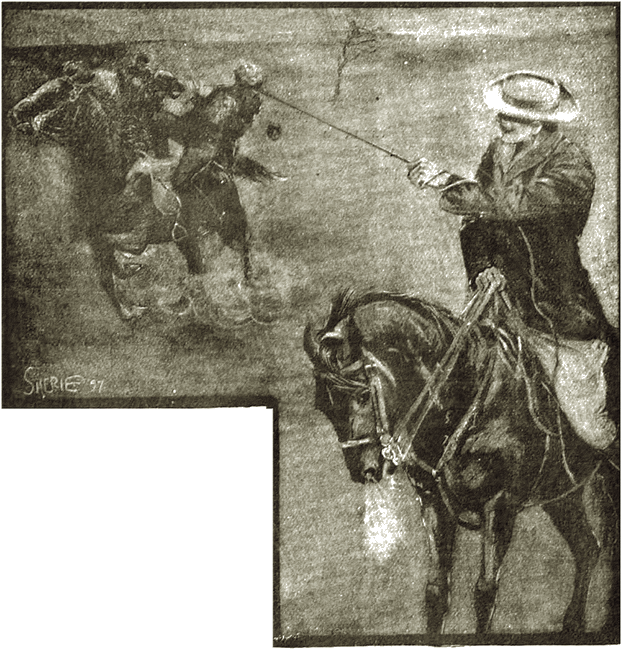
Then came a jerk that nearly broke his neck.
When he came to himself he was half sitting, half lying in a hammock deck-chair in the same little hut in which Ikey Cohen had witnessed the murder of poor little Tommy. There was a burning taste of raw brandy in his mouth and throat, and his head was aching terribly. He looked up and saw a man, with a black cloth mask over the upper part of his face, sitting astride a wooden chair in front of him, with his arms across the back, looking at him through the eye-holes of his mask. Even in the first moments of returning consciousness he seemed to recognise something familiar in him, and the seeming soon became certainty.
"Evenin', inspector. Comin' round a bit? That's right. Been waitin' quite a time to have a bit of a chat with you. Feel up to it now? Have another nip?"
There was no mistaking the drawling tone, or the clip of the word ends. The inspector's rallying thoughts went back to that night at Freetown, nearly eighteen months ago now, when, for the sake of personal pique and a threatened reputation, he had sanctioned—in fact, assisted in the doing of—a deed of treachery and violence, the one unlawful and unmanly act of his life, with which the worst of the offences laid to the charge of the gang would compare only too favourably.
Now he felt instinctively that he was in the presence and at the mercy of the chief of this band of outlaws, against which he had declared war to the death—a man who owed him a grudge that life would hardly pay. Still he had deliberately staked his life on this very venture, and he was not the man to take his stakes off the table when the game was going against him. He looked in silence at the masked man for a few moments to let his thoughts get into something like order. Then he said quietly:
"Well, Mr. Salter, I confess I never expected to see you in the flesh again; but, since you have manifestly resurrected, I don't quite see the point of that mask of yours—at least, not in private life."
"Resurrected! By thunder, sonny, you've hit it in once. Say, did you ever see anything more like a last year's corpse than me?"
He tore the mask from his face as he uttered the last word. The inspector staggered to his feet and dropped back into the chair with a gasp of amazement and a groan of horror mingled in the same breath. What had been Seth Salter's not uncomely face was now a one-eyed, noseless mass of pits and seams and scars too hideous to imagine.
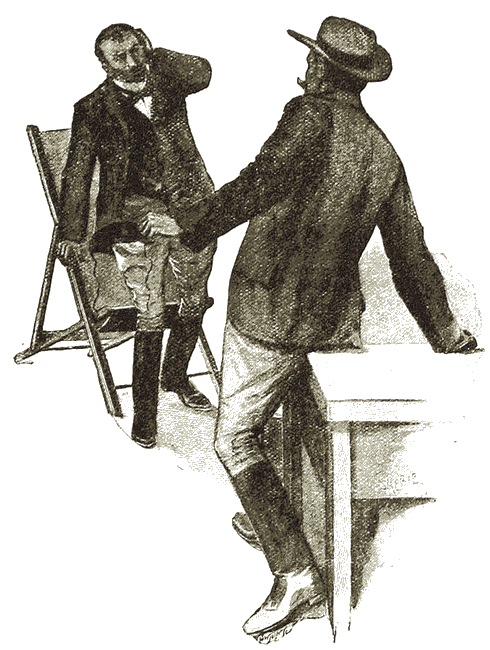
The inspector staggered to his feet.
"Ya-as, looks sorter pretty, don't it? Don't seem to think much of it. Waal, p'raps not, 'tain't likely; but if you an' your chaps didn't exactly do it, them as you was kind enough to leave me to out yonder in the kloof did. Yes, sir, that's vultures' work. I'd a bullet of yours through my right arm, one through the chest from one of your slouches, and a crack over the head with a carbine stock that'd 'a knocked the gruel outer some people's skulls; so, you see, I hadn't much chance agin the critturs. But I thought I'd fight to a finish, and I should hev done if a Cape lad hadn't come through the kloof before I was all gone and toted what was left of me to his hut, and fetched an old kaffir medicine man to patch me up.
"No, you needn't trouble to make any remarks; you're weak yet, and I'm on deck just now. It'll make things shorter and pleasanter if you just make yourself comfortable an' hear me out. I sha'n't worry you with what happened to me just after. I got better, and I'd one eye and a mouth left, as you see, and the eye had to look around for something to put in the mouth.
"Waal, after considerable ups and downs, I met your Lootenant Mays way down in Natal. I told him who I was, or had been—for you can bet he didn't recognise me—and we put our heads together, and worked out this Border Gang scheme. I found the requisite hard cases for the actual work, and he got round your chaps, or kept 'em off the scent, as the case might be. The game worked like an angelic picnic. We robbed thieves, and the thieves dar'n't split. Then, as the organisation got better, we extended things, and by about three months ago we'd half your chaps and nearly all the slops on this side in our pay.
"Waal, we've made tons of money, and we're just thinking about retiring into respectable society; but, Mr. Lipinski, there's just two things I want to do before I do that."
"And those are—revenge on me, and—what else, may I ask?"
"Guess you're nervy, little man, and you may ask. Ya-as, one of 'em's to square up things with you, and the other is to clean out the mail when it takes that big consignment that you tried to fool us over to-night on board, which, I take it, 'll be the day after to-morrow, or, I should say, to-day, for it's morning now. We've got you safe, and all the guard but two are chippin' in with us, so that's as good as done."
"And may I ask again what you intend to do in the way of squaring things up with me? Something with vultures in it, I suppose. I can't growl under the circumstances, though, for the sake of my own conscience, I'd like to tell you that we honestly thought you were dead before we left you. I can't think how you stood all we gave you. What a thousand pities you didn't give the stones up quietly!"
"I guess it is—for you, Why didn't you let me keep 'em, after I'd played the game an' run 'em fair and honourable? But that's nowhere. If I didn't think you a white man, and grit all through, I wouldn't give yer a chance. I'd have your livin' bones, so to speak, picked clean by to-morrow night, as I mighty near had mine. But I believe you did think me dead, and so I'll give you a square show. But I'm goin' to give you half-an-hour's hell first, just to even things up for what I had when I was fighting them vultures."
"And that?"
"I'm goin' to make you play me Chicago, best seven games out of thirteen. If I win, I shall plug you fatally, and go and clean the mail out. If you win, I'll give you back your shooter, and back my one eye agin your two at shootin' on the drop. I'll set the alarum of that clock to go off two minutes after we've taken our places. Then when it goes, we'll go—one or both of us. That's about as fair as I can afford to be. What do you think?"
"I don't see much hell in that, to tell you the truth."
"No, because you seem to have forgotten that Miss Radna's goin' down with the mail that day. You know I've admired her a lot. How d'you think she'd like to have some of the stones we shall get, if I had 'em cut for her as a weddin' present? I shouldn't take the dead gems and leave the livin' and the best of 'em all behind, you bet."
"That'll do, curse you; get out the dice."
"Waal, that's bizness, anyhow, if it ain't over grateful or polite. Take a drink first, just to steady your hand? No? Then I will. Here's the dice. We'll shake for first throw."
Now, for the instruction of the unsophisticated, the game of Chicago is played with dice in this wise: Five dice are thrown. Aces count a hundred, the first six thrown sixty, others six. From five down to two spots are counted. One bone must be left on the table after each throw, hence there are five throws, and the highest possible is five aces, counting five hundred.
The two played in silence. People usually do when the stakes are so big that if they lose they can never play again. The Fates must have been looking over their shoulders, and enjoying the deadly game, for they drew it out to its utmost length. After the tenth game Salter was two ahead, and the inspector won the eleventh by six, and the twelfth by seven.
"Six and seven's thirteen, and we've the thirteenth game to play," said Salter, shaping the first actual sentence that had been spoken since the play began. "Shouldn't wonder if I lost now. That's right, help yourself. Whisky's good for shootin'. My throw, I reckon."
He shook the dice up, canted the box gently over, and the dice trickled out in a little white rattling stream. When they settled there were two aces, a six, a four, and a two.
"Two hundred and sixty's not a bad start, but I guess I'll give the aces another chance." He shook up the three dice. They came out an ace and two sixes. His score was now three hundred and sixty, with two more throws, but he had the option of leaving the six, or including it in the next throw, on the chance of getting an ace instead of it. He left it, and threw the two. They came up six and four, making his total four hundred and twenty-four, with one more throw. He tossed the four into the box, and sent it rolling along the table. When it stopped it was a three.
"I've seen better," he said, as he gathered the dice into the box, and pushed it over to the inspector; "but anythin' over four hundred takes figures to beat it."
Lipinski's first throw was a poor one. Six, five, two threes, and a two! The second throw three aces came up together, making his score three hundred and sixty. The other was a four. He picked it up, threw, and made a three of it. He tried again, and made it a six. He was now four hundred and twenty—four behind.
"Tough luck, but I guess you've got to try again, pard."
The hand of the man was firm, though the heart of the father was shaking as the inspector turned the box over for the last time.
"An ace! By thunder, I thought so! Waal, if that ain't the luck of hell, tell me. There's your gun!"
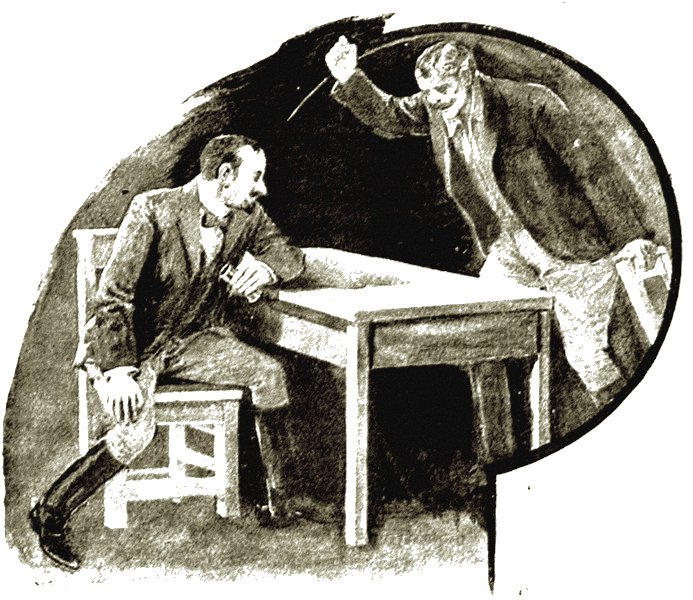
"An ace! By thunder, I thought so!"
W-h-ir-rr—bang—bang—bang.
By every law save that of the unwritten code of gamblers' honour, Inspector Lipinski would have been justified in covering Salter as he went to set the alarum, and he had another very strong motive for doing it, but he didn't. He knew the game, and he played it. They took their places in opposite corners of the hut, about eight paces apart. The little Ansonia clock seemed to think itself a boiler factory for the time being, so loudly did it tick the fatal seconds away.
W-h-irrrr—bang—bang—bang—ting-aling-a-ling—bang—bang—ting—bang—surrr-up.
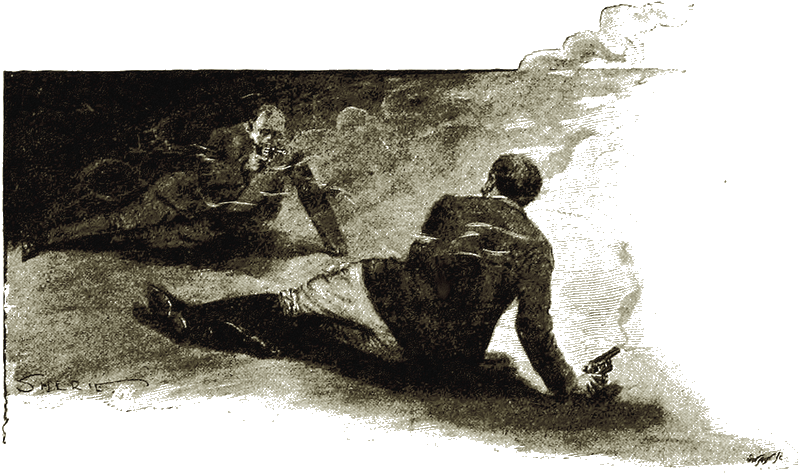
W-h-irrrr—bang—bang...
It was as strange a chorus as mortal ears ever heard, and the little clock seemed to think so, and did its best to keep its end up. When it was over, Inspector Lipinski pulled himself up on to his hands, and, looking across the hut through a mist of blood and a fog of smoke, saw Seth Salter's one eye glaring at him over the barrel of a revolver which was swaying to and fro about a foot or so from the floor.
Then he remembered that his Smith-Wesson had only five chambers. Salter's Colt probably had six. He saw the flame leap from the muzzle, and at the same instant Salter's head dropped with a thump on the floor. A red-hot knife seemed to pierce his shoulder, and then he dropped as well, just too soon to hear angry shouts and the stamping of horses' hoofs outside.
The Free State police didn't mind winking, for satisfactory considerations, at I.D.B., or even at a peaceable form of robbery under arms, but they had neither the stomach nor the heart for a share of blood-guiltiness, and so, when one of the inspector's traitors dropped a hint as to the real purpose for which he had been taken to the hut, their righteously indignant commandant ordered an immediate raid on it.
He got there three minutes too late. Salter was unconscious, and bleeding to death with five bullet holes in him. The inspector was insensible too, but he revived and lived long enough to give the true story of what had happened. The Dutch policeman wisely concluded that a process of white-washing would be good for his soul, so he had the inspector's body conveyed with all honour across the border, and delivered it to the British authorities with such an account of the night's doings as fully insured their being the last of the exploits of the Border Gang.
"Yes," said the gentleman who had given me the main points of the foregoing narrative as we sat under the verandah in the garden of the Central one night after dinner; "yes; Lipinski was a good sort, a very good sort, and so was Salter. I knew them both, and liked them both. It's a pity that two such men should have been started off plugging each other with lead just because they had different ideas about the diamond trade. And it all went for nothing, too. There were I.D.B.'s then, and there are I.D.B.'s now—only they work differently. These infernal stones are too tempting, and as long as diamonds are diamonds there'll be I.D.B.'s of some sort."
Roy Glashan's Library
Non sibi sed omnibus
Go to Home Page
This work is out of copyright in countries with a copyright
period of 70 years or less, after the year of the author's death.
If it is under copyright in your country of residence,
do not download or redistribute this file.
Original content added by RGL (e.g., introductions, notes,
RGL covers) is proprietary and protected by copyright.